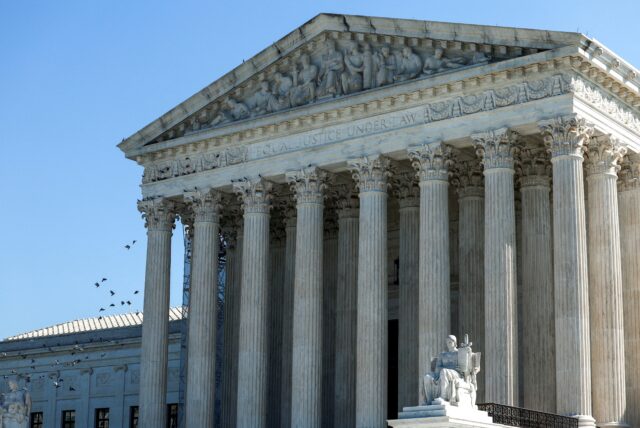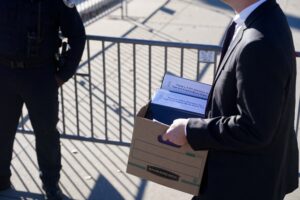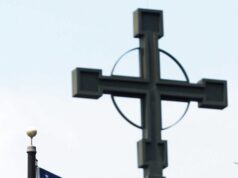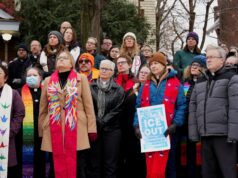
WASHINGTON — As the U.S. Supreme Court considered President Donald Trump’s sweeping tariff policy, economists raised concerns about the potential impact of that policy on the poor.
In oral arguments at the U.S. Supreme Court Nov. 5, justices across the ideological spectrum expressed skepticism of the Trump administration’s claim that the 1977 International Emergency Economic Powers Act, or IEEPA, granted the president unilateral power to impose sweeping tariffs on nearly every country around the globe, with some seemingly suggesting he exceeded his authority in imposing them.
Part of what is at issue in the case is whether the law would consider tariffs a type of “regulation” of imports, as the Trump administration contends would allow him to impose them unilaterally, rather than a tax, which would require congressional authorization.
In effect, a tariff is a tax imposed by a government on imported goods. Trump has argued his tariffs, a key part of his economic agenda, would protect American manufacturing, but some economists have cautioned they will raise consumer prices on many consumer goods, with some economists also predicting they could lead to a recession.
“A tariff is a tax,” Father Stephen Pitts, a Jesuit priest and professor of economics at Marquette University, told OSV News. “And so the question with any tax is, who will bear it?”
Chief Justice John Roberts, seen as a key swing vote, noted IEEPA has never before been used for the purpose of the president imposing unilateral tariffs and suggested the argument that it gave him unlimited authority to do so “seems to be a misfit.”
Justice Neil Gorsuch, Trump’s first nominee to the Supreme Court from his first term, asked some of the most pointed questions of Solicitor General D. John Sauer, the Trump administration’s top lawyer, during oral argument, suggesting that allowing the president to impose tariffs unilaterally would give enormous power to the chief executive.
“Could the president impose a 50% tariff on gas-powered cars and auto parts to deal with the unusual and extraordinary threat from abroad of climate change?” Gorsuch asked as a hypothetical.

“It’s very likely that could be done,” Sauer said.
“I think that has to be the logic of your view,” Gorsuch replied.
“Obviously, this administration would say that’s a hoax, it’s not a real crisis but –” Sauer said, as Gorsuch quipped, “I’m sure you would.”
Tyler Schipper, an associate professor of economics at the University of St. Thomas in St. Paul, Minnesota, told OSV News that he was recently part of an interdisciplinary panel reflecting on Pope Leo XIV‘s “Dilexi Te.”
“In the first paragraph he cites Luke (“he has filled the hungry with good things, and sent the rich away empty”) in a way that could be interpreted as a call for progressive taxation — and would likely be inconsistent with how tariffs are being applied today,” Schipper said.
Schipper argued that the problem with the across-the-board tariffs — such as the ones under the Supreme Court’s scrutiny — “is that they are regressive.”
“They fall hardest among those with the least — hardly showing a preference towards the poor,” he said, pointing to Yale Budget Lab estimates that “the bottom 10% of the income distribution will pay more than 3x more as a percentage of their income than the top 10% of the income distribution.”
“A policy that makes the price of imported goods (and likely domestic goods that face less competition) more expensive at a time when lower-income households are already struggling seems inconsistent with the Catholic Church’s call to care for the poor,” he said.
But Schipper also said that “Catholic social teaching is expansive enough, and tariffs complex enough, that there are undoubtedly situations where tariff policy can support elements of Catholic social teaching.”
“For instance, country-specific or industry-specific tariffs could be used to punish countries that do not enforce safe labor practices or allow workers to unionize,” he said as an example. “Unfortunately, the current set of tariffs is not targeted to meet those objectives and overwhelmingly makes life more difficult for the least well-off in our society.”
Father Pitts also noted the definition of “emergency” is another key factor in the case.
“It is certainly true that there’s a segment of the U.S. population that is suffering,” he said.
“And we’re feeling more and more acutely this suffering, right? I mean, that’s kind of what ‘Hillbilly Elegy’ is about,” he said in reference to Vice President JD Vance’s book. “There’s been all sorts of work by people on all sides about these, you know, like blue collar, non-college educated white men, right? Their life expectancy is declining, the deaths of despair. So emergency, seems like a loaded word. But it seems like an important issue for us to think about in terms of national policy.”
He added that the issue of separation of powers is another key one in the case.
Religious goods industry professionals previously told OSV News the tariffs created uncertainty for their businesses.
A decision in the case is expected by the end of the court’s current term, which usually ends in June.








